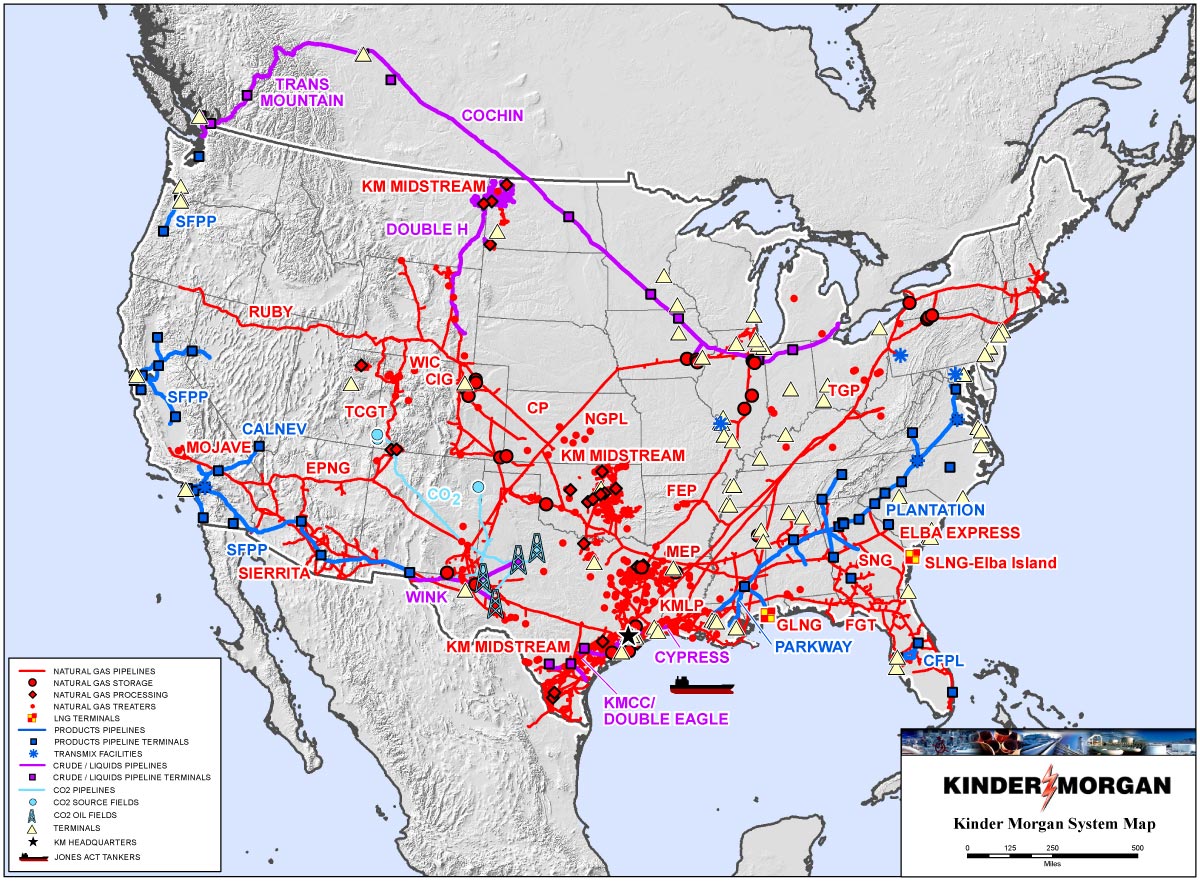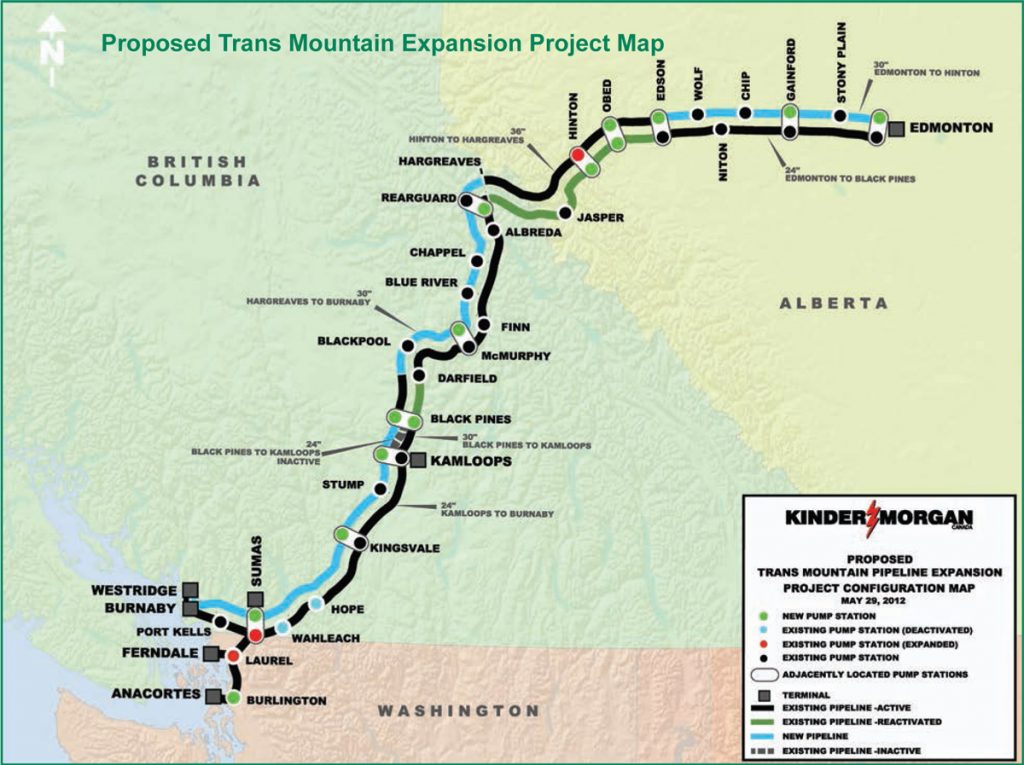Project Wins National Energy Board’s Approval Recommendation, Government’s Final Decision Set for December
Canada’s National Energy Board (NEB) has concluded that Kinder Morgan’s (ticker: KMI) Trans Mountain Expansion Project is in the public interest and recommended the Federal Governor in Council approve the proposed expansion.
The Trans Mountain Expansion, if it receives final approval, will add 980 kilometers of new pipeline to its already existing infrastructure and is estimated to cost about $6.8 billion. If the pipeline is approved, and when it is operational, it could safely transport 890,000 barrels of oil per of day from Edmonton, Alta. to Burnaby, B.C., up from 300,000 today.
In spring 2012, Kinder Morgan Canada first announced it would move forward with its proposed plans to expand the existing Trans Mountain Pipeline system – between Edmonton, Alberta, and Burnaby, British Columbia – following strong commitments received from its customers.

Kinder Morgan owns an interest in or operates approximately 84,000 miles of pipelines and approximately 180 terminals. It’s system transports natural gas, gasoline, crude oil, CO2 and other products, and stores petroleum products and chemicals, and handles bulk materials including coal and petroleum coke.
Trans Mountain filed its comprehensive application with the NEB on December 16, 2013. Filing of the application initiated a regulatory review of the proposed expansion facilities. The company said that if the regulatory application process is successful, construction of the new pipeline could begin in 2017 and the expanded pipeline would be operational in 2019.
According to a KMI press release issued today, the NEB’s recommendation will allow the Project to proceed with 157 conditions if the Governor in Council approves the project.
The Federal Government is scheduled to make the final decision on the Project in December 2016.
“The decision is the culmination of a lengthy and thorough regulatory review process and considers the many thousands of hours of environmental and technical studies, scientific evidence and community engagement that has been part of this comprehensive assessment,” said Ian Anderson, president of Kinder Morgan Canada, in a press release.
To get to this point in the approval process was a huge undertaking for the companies, but represents only about half as long as the approval process for the ill-fated Keystone XL Pipeline expansion in the U.S. TransCanada’s application was ultimately disapproved by the Obama administration.
During the past four years, the project hosted 159 open houses and workshops and hundreds of meetings along the pipeline and marine corridors, as well as more than 24,000 points of engagement with Aboriginal communities, the company said.
“After an initial review of the report, Trans Mountain believes the 157 Project-specific conditions, many in response to input from Intervenors, are rigorous and appear to be achievable.” Trans Mountain is still expecting the in-service date to be December 2019, it said in the news release.
Pipeline Expansion Gives Canada’s Oil Producers Access to Sell to Global Markets
“We have demonstrated the demand for much-needed access to global markets and how building this pipeline will bring both dollars and many thousands of jobs for communities in British Columbia and Alberta at a time when our economy needs it most,” Anderson said.
“This decision is a milestone for the future of Canada,” said Canadian Association of Petroleum Producers President and CEO Tim McMillan in a statement. “The NEB is sending a clear message to Canada: building the infrastructure to get our resources to market is in the best interest of our country.”
New energy infrastructure to connect Canada’s oil resources to tidewater ports will open up the throttle for economic development and put plenty of cash into the province and federal government coffers, according to CAPP.
In a statement, CAPP said the Canadian Energy Research Institute estimates the western Canadian oil industry would contribute an estimated $1.5 trillion in provincial and federal taxes, and provincial royalties over the next 20 years. Governments use these revenues to pay for social services, such as health care and public infrastructure, including schools, roads and hospitals.
$46 billion in Government Revenue, 40,000 Jobs-Equivalent per Year for 20 Years – from Trans Mountain Expansion Project
Kinder Morgan reported that the NEB said the expansion project is expected to generate $46.7 billion in government revenues and 802,000 person years of employment, the equivalent of 40,000 jobs each year, over more than 20 years.
The 1,150-km Trans Mountain pipeline system has been in operation since 1953, providing the only West Coast access for Canadian oil products, including about 90% of the gasoline supplied to the Interior and South Coast of British Columbia, the company said in a statement. It is the only pipeline system in North America that transports both crude oil and refined products to the west coast. TMPL moves product from Edmonton, Alberta, to marketing terminals and refineries in the central British Columbia region, the Greater Vancouver area and the Puget Sound area in Washington state.
The system moves product to California, the U.S. Gulf Coast and overseas through the Westridge marine terminal located in Burnaby, British Columbia. Only crude oil and condensates are shipped into the United States.
Trans Mountain was most recently expanded in 2008 as part of the Anchor Loop Project. Approximately 158 km of pipeline was twinned between Hinton, Alberta and Hargreaves, British Columbia. The open season process, conducted from fall 2011 to fall 2012, received strong binding support from commercial customers. In January 2013, new long-term contracts were signed by 13 committed customers, which was the impetus that bumped the project scope.
The TMPL mainline originates at the Edmonton South terminal, located in Sherwood Park, Alberta. The terminal has 20 incoming feeder lines from throughout Alberta. With the recent completion of the Edmonton Terminal Expansion Project, the site contains 35 tanks and has a capacity of approximately 8 million barrels (1.27 million m³). The main Control Centre located at the terminal remotely monitors all aspects of the Trans Mountain pipeline and terminal operations with the sophisticated Supervisory Control and Data Acquisition (SCADA).
“Perhaps most telling, most of the economic benefits from this project will come after the construction period,” CAPP’s McMillan said. “That is sustainable economic activity and prosperity,” a reference to future decades of sales of Canadian oil production on the global market.
A final decision on the Trans Mountain Expansion will be made by the government of Canada at the end of 2016.


